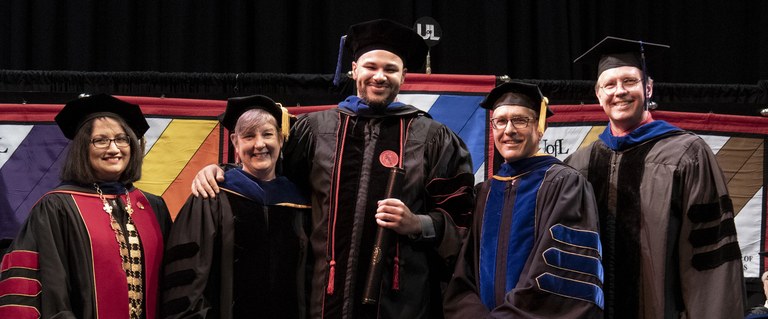Financial Support for Graduate Students
Get paid to get your Ph.D.!
Did you know?
100% of applicants admitted to our graduate programs receive financial support.
ALL students admitted to our doctoral programs receive tuition remission (fall, spring, and summer), health insurance, and a stipend of $25,000 per year (paid across 12 months) for five years* as long as the student remains in good standing in the program. Financial support does not include fees, books, room, board or other out-of-pocket educational expenses. Support is provided through one of the following four mechanisms:
Graduate Assistantships
Graduate Assistants (GAs) are required to work up to twenty hours per week in research (GRA), teaching (GTA), or service in work that closely related to their scholarly activity. GAs are provided a stipend of $25,000 per year, plus full tuition and health insurance from July 1 through June 30. GAs must maintain a 3.0 or higher GPA and make satisfactory progress toward a degree. The assistantship may be renewed, subject to the satisfactory progress toward degree, successful accomplishment of GA duties, and availability of funding. Applicants are automatically considered for these positions.
University Fellowships
Applicants with exceptional credentials may be nominated by the Department for a University Fellowship. The Graduate School awards University Fellowships from a pool of candidates submitted by all Departments in the University that grant Ph.D. degrees. The University Fellowship provides students with tuition, health insurance, and a $25,000 stipend for two years, assuming the student is making satisfactory progress in the program after the first year. If the student continues to remain in good standing thereafter, the Department of Psychological and Brain Sciences will fund a GA (which could require teaching, research, or service to the university) for an additional three years. Applicants are automatically considered for these fellowships.
Diversity Scholarships
University Diversity Scholarships will be awarded, pending availability of funds, to recruit the most qualified graduate students from historically underrepresented groups. A student must be a US citizen or permanent resident to be eligible for this award. In addition to evidence that nominees will contribute to the diversity of the program and the university, competitive nominees typically have a strong undergraduate records and excellent letters of recommendation that speak to the nominee’s scholarly ability and potential to succeed in a graduate program. The Diversity Scholarhip provides students with tuition, health insurance, and a $25,000 stipend for two years, assuming the student is making satisfactory progress in the program after the first year. If the student continues to remain in good standing thereafter, the Department of Psychological and Brain Sciences will fund a GA (which could require teaching, research, or service to the university) for an additional three years. Candidates accepting this scholarship agree to participate in monthly professional development meetings offered through the Graduate School. Applicants are automatically considered for these scholarships.
A&S McSweeny Fellowships
A&S McSweeny Fellowships supplement graduate education support and promote racial and ethnic diversity of the student population in the STEM areas. Programs may nominate students from historically underrepresented ethnic/racial groups, including US citizens and permanent residents who are African Americans, Hispanics, Native Americans, Alaskan Natives, and Pacific Islanders. The maximum award is a full stipend, tuition and health insurance premium. Doctoral students may receive funding up to 2 years pending a positive review after the first year. assuming the student is making satisfactory progress in the program after the first year. If the student continues to remain in good standing thereafter, the Department of Psychological and Brain Sciences will fund a GA for an additional two years. Students may be required to work up to twenty hours per week in research or service work closely related to their scholarly activity. Students are encouraged to participate in UofL diversity activities. Applicants are automatically considered for these fellowships.
Additional Internal (at UofL) Funding Sources:
UofL Presidential Diversity Fellows Supplements
Incoming students from underrepresented groups (racial/ethnic/LGBTQ+/low SES/first-generation college student) who would add to the diversity of our program and would otherwise be financially supported by our department (e.g., with a Graduate Assistantship) may be nominated for a Presidential Diversity Fellowship award. Ten fellows are awarded annually and provide a supplemental stipend of $1000 to be used by the student for professional development purposes; the supplement will be awarded in two $500 installments (one in Fall semester, one in Spring), and may be used for books, research needs, conference travel, and so on. The stipend is renewed annually for up to a total of four years if the student remains in good standing and is making progress toward his or her degree. In addition to the supplemental stipend, students are required to participate in SIGS’ successful “Check-in-and Connect” professional development seminar series, which provides students with cohort support and mentoring. The Presidential Diversity Fellows program is sponsored by the Graduate School and the President’s office.
External (outside UofL) Fellowships & Scholarship for Students from Historically Marginalized Groups
Some students applying to or currently in our doctoral programs may be eligible for external funding opportunities, including:
Ford Foundation Fellowship Programs - for applicants and current students in Clinical and Experimental Psychology (see eligible field list)
- Types of awards: Predoctoral, Dissertation, Postdoctoral
- How to apply: Students apply directly to the Ford Foundation
- Deadline: December
Hispanic Scholarship Fund - for applicants and current students in Clinical and Experimental Psychology (program emphasizes STEM fields)
- How to Apply: Students apply directly to Hispanic Scholarship Fund
- Deadline: February
Southern Regional Education Board (SREB) Programs - for applicants and current students in Clinical and Experimental Psychology (UofL is a participating school for those coming from a participating state)
- Types of awards: Doctoral Scholars Program, Dissertation Year Fellowships
- How to apply: Students apply directly to SREB
- Deadline: March
* Some students may be able to complete the program in four years (plus one year of pre-doctoral internship for Clinical students). These decisions would be discussed on a case-by-case basis with the student’s mentor and the graduate program director.

